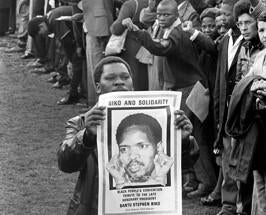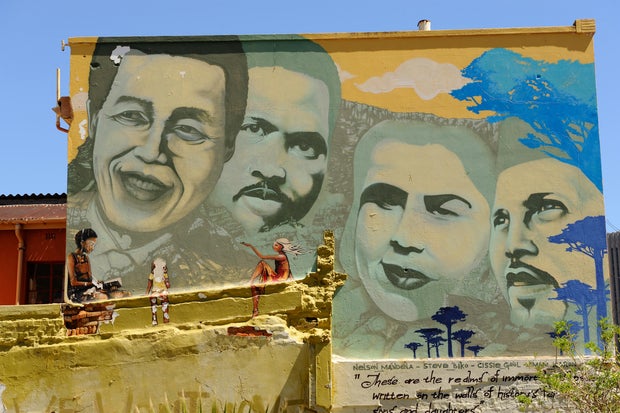Johannesburg — South African activist and anti-apartheid chief Steve Biko died virtually 5 a long time in the past on the age of 30 in police custody. Members of the family and others who noticed his physique that day mentioned he was tortured and killed by South African police, and that he had not died from the results of a starvation strike, as officers claimed on the time.
Prosecutors introduced on Friday that they’d be reopening a proper inquest into Biko’s demise, precisely 48 years to the day after he died.
Biko, a liberation chief who based and led South Africa’s Black Consciousness Motion, turned some of the globally acknowledged victims of the apartheid period following his 1977 demise in a jail cell.
The nation’s Nationwide Prosecuting Authority, in a landmark determination, confirmed it will reopen an inquest to permit judges to rule on whether or not an offense had been dedicated.
SOWETAN/THE SOWETAN/AFP/Getty
No person has ever been held to account for Biko’s demise, and several other cops requested, however didn’t obtain, amnesty for his or her alleged involvement through the hearings of South Africa’s post-apartheid Reality and Reconciliation Fee (TRC).
Biko was arrested at a roadblock in what was then referred to as Grahamstown, now Makhanda, in August 1977. He was accused of violating a so-called “banning order,” a measure within the apartheid-era’s racial segregation legal guidelines that allowed authorities to limit the motion of people deemed a menace.
Twenty days after his arrest he was pushed over 600 miles, bare, along with his legs in shackles at the back of a police car, to Pretoria. He died in jail the day after arriving.
In keeping with experiences from relations and others who noticed his physique quickly after he died, Biko was brutally tortured by apartheid regime police throughout his incarceration and ultimately died of a mind hemorrhage.
The one authorities inquest into Biko’s demise was carried out in 1977, a long time earlier than the top of apartheid rule, and a decide got here to the conclusion that nobody was guilty.
However his demise was met by a world outcry, and requires sanctions towards the apartheid authorities and its leaders helped gas the worldwide motion towards the racist regime.
Biko’s life was immortalized in music by Peter Gabriel’s “Biko,” simply three years after his demise, after which once more by reggae dancehall artist Beenie Man’s “Steve Biko” in 1997. Denzel Washington performed the anti-apartheid icon within the 1987 Hollywood film “Cry Freedom.”
STF/AFP through Getty
5 former cops from the South African regime’s feared Particular Department testified on the TRC that Biko had attacked one in all their colleagues with a chair, and that in an ensuing scuffle to restrain him, he hit his head towards the wall, inflicting his demise.
They admitted underneath cross-examination, nevertheless, that that they had colluded and submitted false affidavits through the preliminary 1977 investigation.
“My dad was a really wholesome man, and we all know he died of a extreme mind hemorrhage,” Biko’s son Nkosinathi Biko mentioned in an interview this week with the broadcaster Newzroom Africa. “Through the TRC course of it was clear underneath intense cross-examination that one of many males admitted that they grabbed his head and rammed it into the wall which brought about his demise. They have been denied amnesty on the TRC due to course they lied.”
The TRC, which carried out its work between 1996 and 2001, beneficial greater than 300 circumstances for prosecution by the Nationwide Prosecuting Authority. Up to now, nobody has been prosecuted for these alleged apartheid-era offenses, nevertheless, leaving many households, together with Biko’s, annoyed.
“It is very clear that the historical past books of this nation must be corrected,” Nkosinathi Biko mentioned within the interview. “The physique of my father is a dwelling testomony to his final minutes and the torture and violence that was visited upon him. We must always by now have handled these issues 30 years into our democracy, and it ought to have been dealt with higher.”
Frédéric Soltan/Corbis through Getty
In April, South African President Cyril Ramaphosa ordered an inquiry into whether or not earlier governments had deliberately blocked investigations and prosecutions of apartheid-era crimes.
The Nationwide Prosecuting Authority has been underneath strain to carry formal expenses for apartheid-era crimes allegedly dedicated by people who didn’t obtain amnesty by the TRC course of, in addition to to carry accountability and solutions to unresolved circumstances of gross human rights violations through the apartheid regime.
Nkosinathi Biko mentioned his father’s legacy was about giving and investing in a shared society, and he mentioned setting the report straight was an important step ahead for the nation.
“I feel that our sense of triumph, our sense of therapeutic, rests within the prosecution, which is important within the inquests,” he mentioned. “But it surely additionally rests in guaranteeing that we appropriate the historical past of this nation and we intensify the worth of human life and human dignity.”












